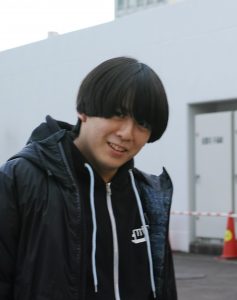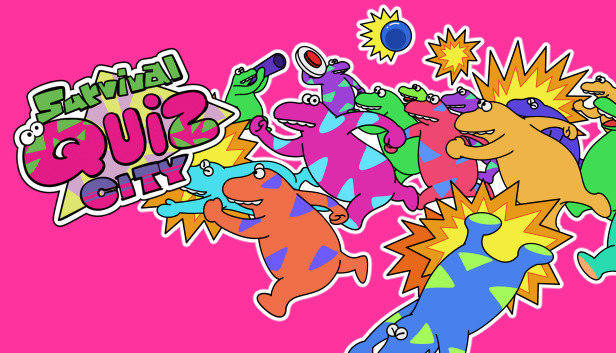Creators in BANDAI NAMCO Studios (BNS) work passionately to create games that everyone can enjoy. But what exactly is the source of their passion?
This series of articles will talk about how the creators at BNS apply the things and experiences they like to game development.
We’ve asked Yusuke Shigeta, Producer and Director of Survival Quiz City, to be the first entry in this series. He mostly talked about the development of indie-style games through BNS.
Developing Survival Quiz City
―――Hello. Let’s start by telling us a bit about yourself.

I am the Producer and Director for Survival Quiz City. That said, the development team is quite small, so I also take on developer roles such as writing specifications, adjusting the action segments, stage design, level design, and more! You could say I’m a jack of all trades.
I first joined BNS in 2015, so this would be my seventh year with the studio. Before Survival Quiz City, I was involved in developing bigger titles.
―――Tell us a bit more about Survival Quiz City.
Survival Quiz City (SQC) is a multiplayer online quiz action game. The SQC website has all the information you need!
The development for SQC all began when the project I was working on had settled down, so I took some time to write out a proposal. I showed it to my manager to get their opinion on it and they told me I should give it a shot. This discussion happened around autumn of 2018, and our first steps into development was around the beginning of 2019.

―――So does this mean development took you around two and a half years?
Development initially started as an internal tech research project. We had a hard time getting members for our team, since the studio tends to prioritize large projects over tech research. I was also working on another project, which meant that no work was done on SQC for about half a year.
When 2020 came around and we switched to our current President & CEO, we were able to make progress on the project since he was vocally supportive of spending more time on indie-style projects.
―――That’s great!
That said, we had a fairly limited budget for the project. We often found that we couldn’t use the same methods in SQC as we would on typical game projects. It was very challenging, but fun, to work within these restraints and lead the project to completion. For example, we would often think of how we could make the game with our small team size, or what would be the most efficient way to implement something given our tight schedule.
Despite these restrictions, the fact that we were developing a new title from scratch meant that we had many degrees of freedom to work with. I felt that every day of development was hard work, but also a lot of fun!
―――So what’s different between developing SQC and a regular game?
Larger titles developed by BNS use external companies to help with debugging, for example. We would then choose what to fix based on their reports.
But we had to do all of this by ourselves for SQC, and it was a lot of work. It was mentally taxing just thinking about having to debug by ourselves with our limited time and staff, but it helped me realize that this was something I had been taking for granted (laughs).
―――Lots of new discoveries, I see.
We don’t have any experience making indie-style games in BNS, so there were surprises for us every day. It would be nice to apply the knowledge we got from developing SQC to establish a workflow for future indie-style game projects in BNS.
Even in Japan, I don’t think there are many game development studios that are capable of creating everything from large-scale titles to indie-scale titles. It would be great if students or other developers heard that BNS is capable of developing indie-style games and became interested in pursuing a career with us.
―――What do you think is an important trait for game developers?
This depends on the job type, but I personally think that it’s important to be curious as a game developer.
I think that game development is suited for people whose interests are multifaceted and not only limited to video games. Of course, there are advantages to people who only think about games, but I think people with a wide range of interests might be better suited to the job. Having hobbies unrelated to video games such as music, books, or traveling, and relating your experiences back to game development might be unexpectedly important! I feel that many creators at BNS have a wide range of hobbies which means they can quickly switch gears to different types of tasks.
―――What do you keep in mind when developing games?
I try to add something new to whatever game I’m involved in making, though it doesn’t work out sometimes (laughs). I always think that it would be nice to add something new since we’re going through the effort to create a game.
When I first wrote the plan for SQC, there weren’t many games where a large number of players could mess around together, and the concept of splitting gameplay based on the results of a quiz was also new, so I used these as the main elements of SQC.
The appeal of indie games with a strong personality that doesn’t try to appease everyone.
―――Is there a reason to your fixation on adding new things?
I’m attracted to things that feel new or unique, and I try to incorporate something new into the things I make.
One of my hobbies is music, but I tend to prefer underground music to mainstream music. Most of the music I like is more novel and experimental in nature.
The same applies to my taste in games. New releases in popular series or other large titles are reliable in terms of the quality of their stories and worldbuilding, and are fun to play. (I often play them myself.) But I find myself gravitating towards indie games that are out of the ordinary and might not be for everyone.
That said, it’s not just about doing new things for the sake of being new, you also need to consider if it’ll result in making the game fun. It’s difficult to be confident that a game you’ve made is fun until you have other people actually play it, since that’s when you’ll get their first impression. I’m always worried if people will enjoy what I make when I’m working (laughs).
―――Are there other things you try to keep in mind when working?
I like my job, but I also value my time off work. I make sure to keep my work life and private life separate, and I try to not think about work when I’m not on the clock. Ever since we’ve started working from home, I’ve paid extra attention to keeping the two modes separate so I can switch between my on-the-job mindset and off-the-job mindset.
A big benefit of working from home is that there’s no commute time. I can start working right after I wake up, and my private time starts right after I “leave” work. It also allowed me to spend the energy I would use commuting towards my tasks. In fact, this was so important that I don’t think the SQC project could’ve happened if we didn’t work from home.
―――What do you mean?
Since we’re a small team, each person on the team has to be able to a lot of work. I think I was able to focus all of my energy on development since I no longer had to commute and could reroute that energy towards work (laughs).
Not many members were able to fully commit their time towards development, but I was able to get help along the way from everyone on the team. I hope it ultimately results in a game that’s loved by everyone.
―――I look forward to when SQC comes out! Thanks Shigeta-san!
「Survival Quiz CITY(サバイバルクイズシティ)」
©BANDAI NAMCO Studios Inc. Published by Phoenixx Inc.




